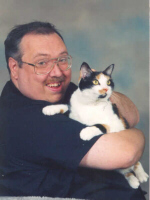February 2004
Chaplain's Counsel
Dear brother Knights,
My parish is a lot like our council, filled with dedicated people but with a rapidly rising older population. I have recently buried a few devout parishioners and good friends. It seems that the names of the deceased is also growing longer for our K of C necrology. We do not like to look upon death. We run away from it. Our departed loved ones are dressed and painted to look as much alive as possible. Wakes before funerals have grown shorter and sometimes there is only an hour or two of vigil before the final services and burial. No one seems to know what to say. “She looks really good.” But she is dead. “It is a handsome suit he is wearing.” But, it is a half-suit, pinned to the cushions. “She was a good mother.” Death has stolen her from us. “I like the way they did her hair.” Actually the chemo made her bald and it is a wig. “He looks so at peace.” Yes, but what about us? “We will miss him.” Then why did you never visit while he was still alive? “God bless him and you.” Well, that is sure a turnaround from the curses you shouted not long ago. “I can’t believe he is really gone.” That must be why you are suing for a part of his estate. Before the service or Mass begins, a number of people head for the door. They have done their part. The book has been signed, flowers and a card sent, a few quick handshakes and words of lamentation. Someone begins to cry. No one knows what to do. Can they get her to stop? We all have to get through this, get it over, and go home. We do not like to face our own fear, the certain prospect about which we always divert our attention— our loss and the truth about mortality. Some day, we will be the ones in the boxes surrounded the flowers. The urns will contain our ashes. It is against this truth and fear about death that we celebrate the Easter mystery.
Every funeral Mass is a miniature Easter service. As Knights we "remember death" and acknowledge that it is only against the backdrop of death that Easter hope and joy makes any sense. Perhaps as our society pushes death out of common everyday consciousness, we also negate or cloud the mystery of eternal life in Jesus Christ? I suspect that many people pretend that they will live forever. Doctors become their high priests, using their craft to save their lives. Nevertheless, their ministrations will ultimately fail. Thousands of people have their heads or whole bodies frozen in cryogenic containers in the hope that some future technology might revive them and grant immortality. Serious research in aging has concluded that the brain switches on a death hormone that causes the human body to decay and die. A number of scientists think they might be able to shut it off and grant people a perpetual youth. If developed, such technology will probably belong exclusively to the rich and powerful. We can trust that such benefits will be kept from the so-called rabble of a world deemed overpopulated. Tyrants and dictators could hope to oppress their people for hundreds of years. Methuselah would be reborn. Already scientists are predicting that it will be possible to create cloned replications of ourselves and that it may be possible to download the personalities and memories of people into ageless electronic brains with artificial bodies. It sounds like science fiction, but so do space rockets and desktop computers.
While we can master science, the danger here is that science might master us. Some possibilities lower the human person to the level of flesh or of the machine. The soul is dismissed and man tries to save himself apart from God. Narcissism has never known such a golden age as our own.
We do not want to die. This is a basic human desire. We want to live and to be happy. As in our other desires— for drink, for food, for companionship, etc.— so too this desire is part of our makeup as creations of God. Divine design mandates that natural desires can be fulfilled; God would not have given us a supernatural yearning for life beyond the grave without some way of achieving that ends. The Christian revelation on this is centered upon the person of Jesus. The other theme that comes to the fore during Easter is that of reunion. Jesus ascends to the Father, not to leave us orphaned but to make himself more present to believers everywhere in his Mystical Body, the proclaimed Word and the living Sacraments. Jesus sits at the right hand of the Father as our advocate and great Mediator.
Let us keep the faith and recruit many more men to serve the Lord after we are gone from the veil of tears.
Fraternally yours,
Fr. Joseph Jenkins


0 Comments:
Post a Comment
<< Home